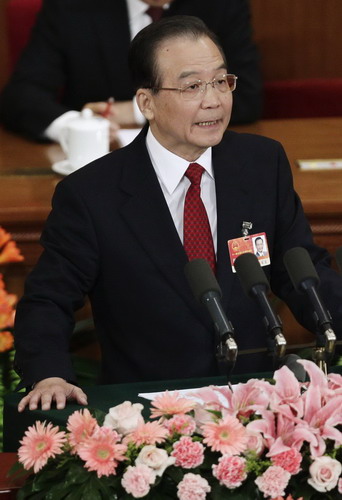
Premier Wen Jiabao delivers his government work report during the opening ceremony of the National People's Congress (NPC) at the Great Hall of the People in Beijing March 5, 2011. [Photo/Agencies]
BEIJING- China opened its annual parliamentary session on Saturday, unveiling a five-year development blueprint and striving to handle pressing economic issues including inflation.
Nearly 3,000 National People's Congress (NPC) deputies from across the country, and more than 2,000 members of the National Committee of the Chinese People's Political Consultative Conference (CPPCC), the top political advisory body, are present in the Great Hall of the People at the opening meeting of the Fourth Session of the 11th NPC.
The world is watching how China copes with the current complex situation and seizes the strategic opportunity for its development in 2011, the start of its 12th Five-Year Plan and the 90th anniversary of the founding of the Communist Party of China (CPC).
At the meeting, Premier Wen Jiabao delivers a report of government work. Top CPC and state leaders Hu Jintao, Wu Bangguo, Jia Qinglin, Li Changchun, Xi Jinping, Li Keqiang, He Guoqiang and Zhou Yongkang are present at the meeting.
In his work report, Wen said China "still faces an extremely complex situation for development this year."
"The world economy will continue to recover slowly, but the foundation for recovery is not solid," he said.
He noted some long-term and short-term problems in China's economic activities were intertwined, and institutional incongruities and structural problems were stacked up together, making the country's macro-control more difficult.
China will increase its gross domestic product (GDP) by around 8 percent this year, further optimize the economic structure, keep the consumer price index (CPI) increase around 4 percent, create more than nine million jobs in urban area and keep the registered urban unemployment rate at 4.6 percent or lower, according to the report.
China sets a target of 7 percent of annual economic growth over the next five years with significant improvement in the quality and performance of economic development, according to Wen.
Wen said China needs to maintain continuity and stability in its macroeconomic policies and make them more targeted, flexible and effective.
"We need to correctly strike a balance between maintaining steady yet rapid economic development, restructuring the economy and managing inflation expectations, pay more attention to maintaining overall price stability, and prevent large economic fluctuations," he said.
To check price hikes, China will make stabilizing price levels a "top priority" in its macroeconomic control this year, according to Wen.
To control the rise of prices, China will manage market liquidity, ensure the production and supply of major farm products and daily necessities, strengthen the oversight and supervision of prices, maintain market order and improve the system of subsidies, according to the report.
Sheng Yafei, an NPC deputy and Communist Party chief of the Songjiang district of Shanghai, said he had confidence in the central government in controlling commodity prices this year despite all the difficulties.
"There are favorable conditions for the country to control commodity prices: we have had gains in grain output for seven consecutive years, abundant supply of industrial products, and huge foreign exchange reserve," he said.
Some foreign media believe the shift from an economy based on exports and public works projects to one powered by consumer spending will be a crucial part of the effort to rebalance global trade.
Zhuang Jian, a senior economist with the Asian Development Bank, said China faces heavy tasks of improving people's well-being.
The goal of economic development is not about building skyscrapers or scoring higher grades in its GDP, it is about improving people's lives, he said.
To spur development in sectors concerning people's well-being will help China pursue a sustainable economic growth model, he added.
When asked to comment China's measures to readjust income distribution, Zhuang said narrowing income gap will stimulate the consumption of China's huge population of middle- and low-income households and will be conducive to the expansion of domestic demand.
Moreover, it is a decisive factor of maintaining social harmony and stability, he said.
According to Wen, three major measures will be taken in 2011 to bridge yawning income gap: increasing the basic incomes of low-income people in both urban and rural areas, putting more effort into adjusting income distribution, and vigorously overhauling and standardizing income distribution.
The premier also outlined targets to regulate the real estate market, which were hailed by NPC deputies and CPPCC National Committee members as an effective response to public concern.
However, Sheng Yafei warned that authorities must be more careful in formulating plans to achieve these targets.
"When it comes to the implementation of relevant policies on real estate, I think authorities should be more considerate and implement more detailed plans," he said.